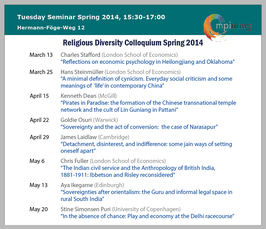"A minimal definition of cynicism. Everyday Social Criticism and some meanings of ‘Life’ in contemporary China"
Religious Diversity Colloquium Spring 2014
- Date: Mar 25, 2014
- Time: 03:30 PM - 05:00 PM (Local Time Germany)
- Speaker: Hans Steinmüller (London School of Economics)
- Hans Steinmüller is a specialist in the anthropology of China working at the London School of Economics. He has conducted long-term fieldwork in the Enshi region of Hubei Province in central China, focusing on family, work, ritual, and the local state. The main object of his research are the ethics of everyday life in rural China, but he has also written on topics such as gambling, rural development, and Chinese geomancy (fengshui). At LSE, he is the convenor of the MSc programme ‚China in Comparative Perspective‘.
- Location: MPI-MMG, Hermann-Föge-Weg 12, Göttingen
- Room: Conference Room

For more details please contact vdvoffice(at)mmg.mpg.de.
Ordinary people and academics alike complain about a crisis of public morality in China. There are famous news cases said to be symptomatic of this crisis: the milk powder scandal of 2008, when a number of infants died because a large dairy company had adulterated formula with cheap chemical ingredients, or the passers-by who ignored a toddler driven over by a van in Guangzhou. The corruption of party officials at all levels is a favourite topic of everyday conversation, and so is economic success by all kinds of dubious methods. At the time of this breakdown of public morality, it might seem that the prevalent mode of engaging with society and the state in contemporary China is ubiquitous cynicism - but is everyone cynical in the same way? In this presentation, I use a ‚minimal‘ definition of cynicism as social criticism; that is, an action that implies some interpretation of ‚life itself‘ that is contrasted with current conventions. Various cases, from the historical memories of the Cultural Revolution to the self-descriptions of gangsters and mistresses, and the strategic manipulation of discourse by party officials are discussed. Rather than a master narrative of cynicism, I describe cynical action as an expression of the multi-vocality of persons and the self-reflectivity of everyday life in contemporary China.